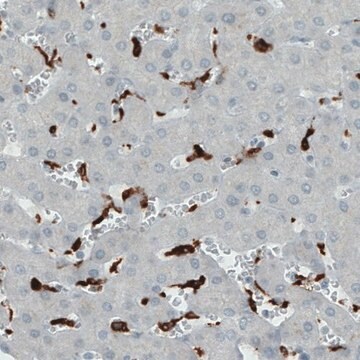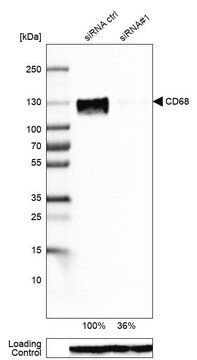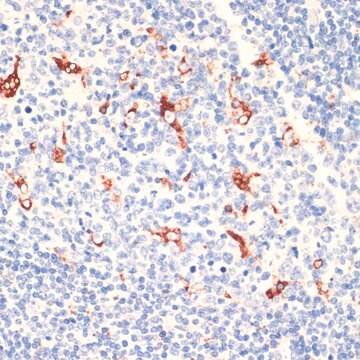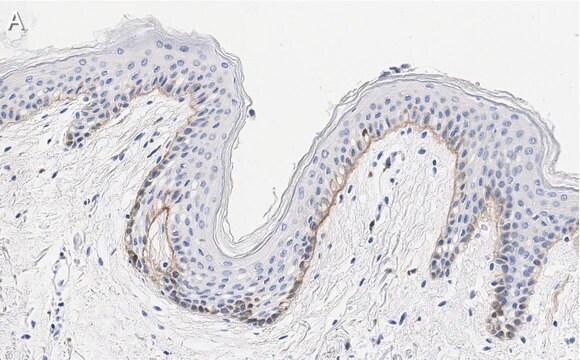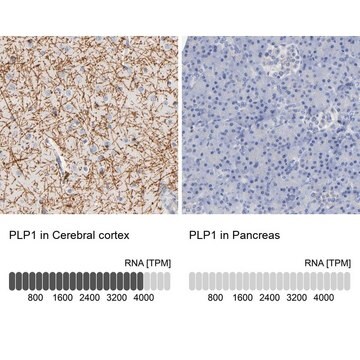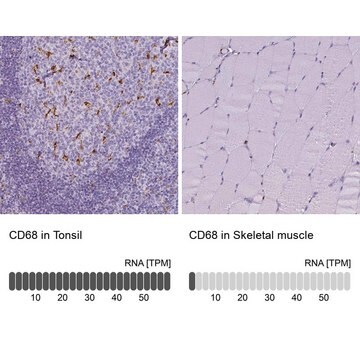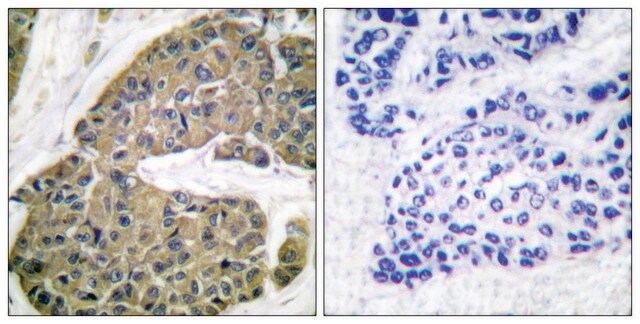一般說明
We are committed to bringing you greener alternative products, which adhere to one or more of The 12 Principles of Green Chemistry.This antibody is Preservative-free, produced without the harm or sacrifice of animals and exceptionally stable to allow for ambient shipping and storage if needed and thus aligns with "Waste Prevention", "Designing Safer Chemicals" and "Design for Energy Efficiency".
Click here for more information.
ZooMAb® antibodies represent an entirely new generation of recombinant monoclonal antibodies.Each ZooMAb® antibody is manufactured using our proprietary recombinant expression system, purified to homogeneity, and precisely dispensed to produce robust and highly reproducible lot-to-lot consistency. Only top-performing clones are released for use by researchers. Each antibody is validated for high specificity and affinity across multiple applications, including its most commonly used application. ZooMAb® antibodies are reliably available and ready to ship when you need them.
特異性
Clone 2L16 is a ZooMAb® Rabbit recombinant monoclonal antibody that specifically detects human Macrosialin/CD68. It targets an epitope within 16 amino acids from the N-terminal, extracellular domain.
免疫原
KLH-conjugated linear peptide corresponding to 16 amino acids from the N-terminal region of human Macrosialin/CD68.
應用
Quality Control Testing
Evaluated by Western Blotting in U937 cell lysate.
Western Blotting Analysis: A 1:1,000 dilution of this antibody detected Macrosialin/CD68 in U937 cell lysate.
Tested applications
Affinity Binding Assay: A representative lot of this antibody bound CD68 with a KD of 2.6 x 10-8 in an affinity binding assay.
Immunohistochemistry (Paraffin) Analysis): A 1:1,000 dilution from a representative lot detected Macrosialin/CD68 in human tonsil tissue sections.
ELISA Analysis: A representative lot detected Macrosialin/CD68 peptide.
Note: Actual optimal working dilutions must be determined by end user as specimens, and experimental conditions may vary with the end user
Anti-Macrosialin/CD68, clone 2L16 ZooMAb®, Cat. No. ZRB1427, is a recombinant Rabbit monoclonal antibody that specifically targets of Macrosialin/CD68 and is used in Affinity Binding Assay, ELISA, Immunohistochemistry (Paraffin), and Western Blotting.
標靶描述
Macrosialin (UniProt: P34810; also known as Gp110, CD68) is encoded by the CD68 gene (Gene ID: 968) in human. CD68 is a single-pass type I membrane glycoprotein that is synthesized with a signal peptide (aa 1-21), which is subsequently cleaved off to generate the mature form that contains an extracellular domain (aa 22-319), a transmembrane domain (aa 320-345), and a short cytoplasmic tail (aa 345-354). It also contains a mucin-like domain (aa 23-140) and has two 30 amino acid long repeats (aa 70-99 and 100-129), proline-rich hinge (aa 140-152), and a LAMP-like domain. CD68 is highly expressed in blood monocytes and tissue macrophages. Its expression is also observed in lymphocytes, fibroblasts, and endothelial cells. It is also found in many tumor cells and allows them to attach to selectin on vascular endothelium, facilitating their dissemination to secondary sites. CD68 is mainly located in the endosomal/lysosomal compartment but can rapidly shuttle to the cell surface. In macrophages, it plays a role in their phagocytic activities, both in intracellular lysosomal metabolism and extracellular cell-cell and cell-pathogen interactions. It binds to tissue- and organ-specific lectins or selectins, which allows for homing of macrophages to particular sites. It has a good predictive value as a prognostic marker of survival in cancer subjects. CD68 expression is shown to be upregulated in macrophages in response to inflammatory stimuli, such as exposure to oxLDL, lipopolysaccharide, or interferon-g. Hence, it can serve as a good histochemical/cytochemical marker of inflammation associated with the involvement of monocytes/macrophages. Its expression is not observed in dendritic cells; hence it can be used to immunohistochemically distinguish macrophages from dendritic cells. This ZooMAb® recombinant monoclonal antibody, generated by our propriety technology, offers significantly enhanced specificity, affinity, reproducibility, and stability over conventional monoclonals. (Ref.: Chistiakoc, DA., et al. (2017). Lab. Invest. 97(1); 4-13).
外觀
Purified recombinant rabbit monoclonal antibody IgG, lyophilized in PBS with 5% Trehalose, normal appearance a coarse or translucent resin. The PBS/trehalose components in the ZooMAb® formulation can have the appearance of a semi-solid (bead like gel) after lyophilization. This is a normal phenomenon. Please follow the recommended reconstitution procedure in the data sheet to dissolve the semi-solid, bead-like, gel-appearing material. The resulting antibody solution is completely stable and functional as proven by full functional testing. Contains no biocide or preservatives, such as azide, or any animal by-products. Larger pack sizes provided as multiples of 25 μL.
重構
300 μg/mL after reconstitution at 25 μL per vial. Please refer to guidance on suggested starting dilutions and/or titers per application and sample type.
儲存和穩定性
Recommend storage of lyophilized product at 2-8°C; Before reconstitution, micro-centrifuge vials briefly to spin down material to bottom of the vial; Reconstitute each vial by adding 25 μL of filtered lab grade water or PBS; Reconstituted antibodies can be stored at 2-8°C, or -20°C for long term storage. Avoid repeated freeze-thaws.
法律資訊
ZooMAb is a registered trademark of Merck KGaA, Darmstadt, Germany
免責聲明
Unless otherwise stated in our catalog or other company documentation accompanying the product(s), our products are intended for research use only and are not to be used for any other purpose, which includes but is not limited to, unauthorized commercial uses, in vitro diagnostic uses, ex vivo or in vivo therapeutic uses or any type of consumption or application to humans or animals.

